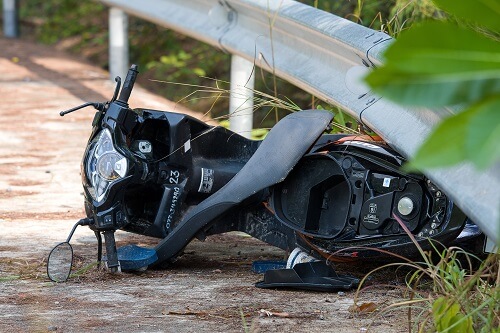In the unfortunate event that you become involved in a motorcycle accident, a motorcycle accident attorney can help you throughout the process of filing lawsuits or negotiating for compensation. Additionally, if you are accused of being at fault for a motorcycle accident, an attorney can help assist you throughout the process of defending yourself. However, you may be wondering what you should do directly following a motorcycle crash. Below are some steps you should take immediately following a motorcycle collision.
After Your Motorcycle Accident
1. Get to a Safe Place
The first thing to do after getting into a crash on your bike is to get off the street and onto the sidewalk or shoulder of the road. If you cannot move, ask for assistance from any witnesses so that they may help block traffic. Attempt to limit your movement and make your own safety a priority over your bike.
2. Call 911
The next thing you should do is call for the authorities and medical attention should you need it. If you cannot call yourself, ask a witness to dial them. The sooner police and paramedics arrive at the accident scene, the better.
3. Assess the Situation
Accidents can be shocking, but after an accident, it is best to try to remain as calm and grounded as possible. Take a moment to evaluate how you feel physically and cognitively and remember the chain of events surrounding the accident. Pausing to assess the situation can make clearly and accurately speaking to police and medical professionals easier.
4. Report All Pain & Symptoms
Whether speaking to emergency paramedics or receiving a medical evaluation after the accident, you must give the medical professionals as much information as you can. You should report where you fell, how you landed, which body parts were impacted the most, and how you physically feel if you are experiencing any discomfort or numbness. It is also essential to receive an evaluation from a medical professional even if you are not experiencing any discomfort. Pain from collisions can appear weeks or even months after an accident.
5. Collect Evidence
If it is possible for you, while still at the scene of the accident, you should take pictures of the accident scene. If you are unable, you should ask if any witnesses could take pictures for you. Additionally, you should hold on to records such as hospital bills, medical bills and care summaries, and vehicle repair bills. If you had to miss work due to the collision, ensure that you also make a record of the time and pay lost due to your injuries.
6. Seek Help From a Motorcycle Accident Attorney
After receiving medical attention after the accident, you should reach out to an experienced motorcycle accident lawyer to discuss the details of your case and receive advice regarding the next steps you should take to ensure you are fairly represented.
Motorcycle Accident Don’ts
1. Don’t Attempt to Remove Items
After a motorcycle collision, do not remove your helmet or safety gear, as this may worsen any medical conditions you may have. You may feel fine, but this could be caused by an adrenaline rush due to the crash. If you have any glass or metal shards in your body, don’t try to remove them before emergency responders arrive.
2. Don’t Attempt to Move Your Bike
Unless you are trapped under your bike, do not attempt to move your motorcycle. Remember, the accident may be considered a crime scene, and moving it may compromise evidence.
3. Don’t Admit to Fault
While it is best to be honest with police officers, it is advisable to consult with an attorney before reporting to police anything that may be used against you. When it comes to collisions, sometimes evidence contributing to the accident does not become available until later, and the fault is not always apparent. Therefore, disclosing whether or not you were wearing proper safety gear, have functioning lights on your vehicle, or were following traffic laws should not be disclosed until you have had a chance to speak to an attorney. Report the chain of events leading to the accident as you saw it, and ensure that you do not assume guilt until you know all the facts.
4. Don’t Leave the Accident Scene
When involved in a collision involving a motorcyclist, whether you are a car or truck driver or the one driving the motorcycle, you must never flee the scene, as this may place you under more liability. While hit-and-run laws vary from state to state, in many instances, you may face consequences such as jail time, license suspension, fines, or worse, depending on the extent and nature of damages that you become liable for.
If You Are in a Motorcycle Crash in North Carolina, Call Tatum & Atkinson
After becoming a motorcycle accident victim, you are entitled to compensation for your damages, including bodily injuries, loss of income, or damages to your bike. Retaining an experienced professional to assist you throughout the claims process is vital. If you become seriously injured, you may face hefty medical expenses, permanent injuries, loss of wages, and much more. Having an experienced motorcycle accident injury attorney fight for your case will increase your chances of getting the maximum compensation for your pain and suffering.
While it is always best to practice safety measures to prevent injury when riding, accidents can happen no matter how careful you are. Additionally, it is best to be prepared in the unfortunate event that a motorcycle accident does occur. It is best to find a personal injury lawyer with experience representing motorcycle accident victims and knowing the specific nuances of the type of case.
Contact Tatum & Atkinson “The Heavy Hitters” today at (800) 529-0804 or contact us online to set up your free consultation. We have decades of collective experience defending car and motorcycle accident injury victims to get the justice they deserve.

